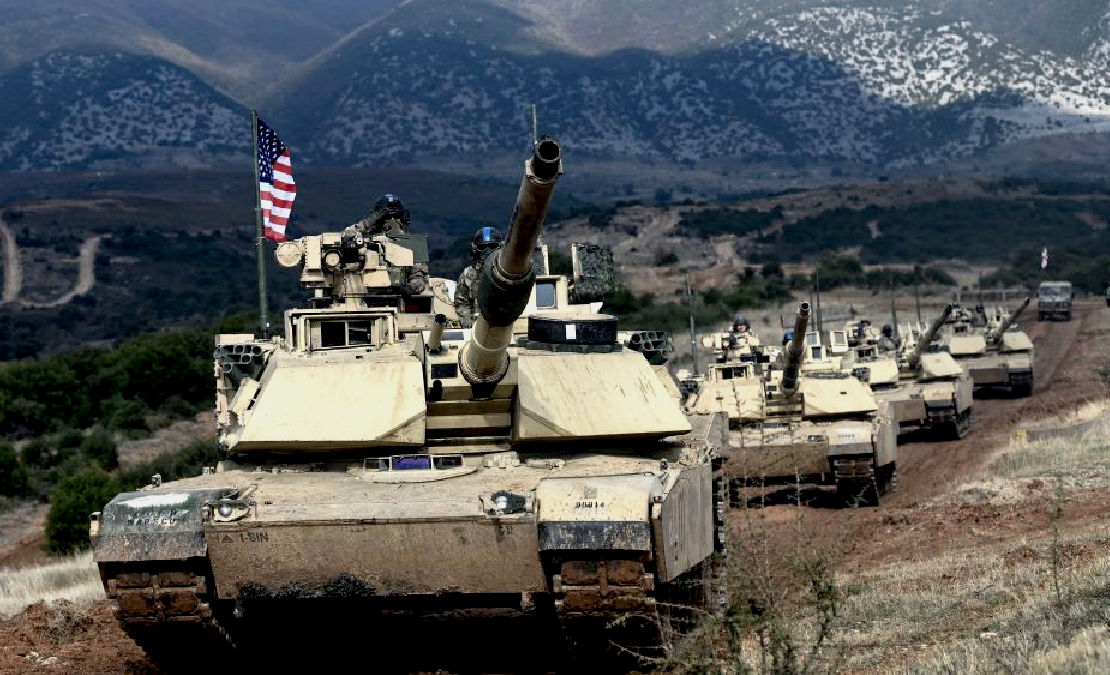Leaders
of the Free World should be clear, the invasion of Ukraine
by Russia, is not just Russia pushing communist ideals
alone, it is more of a concerted and well coordinated plan
by the CRINKS, to overtake democracy, as sure a water
flows downhill. Our view of course. But we feel a view
shared by most well informed citizens who respect human
rights, and wish for an administration where their vote
might actually count for something. Granted, that
politicians in democracies also lie to their electorate.
Mainly, to get themselves elected. Where the truth as to
mismanagement stinks to high heaven. But what is worse?
We
should be grateful for the obvious talents of President
Zelenskyy, his daring and courage in the face of adversity.
Not many very strong men could have stood up to the
bully-boy tactics of Putin, knowing that he is not fighting
Russia alone, but any country who still trades with the
second largest CRINK nation. Russia being fed drone weapons
from Iran, with other assistance from North Korea.
The
shock in all of this is India still buying oil from Russia.
Giving the rest of the world a clear indication that
Narendra Modi is blowing with the financial wind, rather
than looking to defend Indian citizens from the inevitable slow
absorption of free will. Unless, they are looking to Planet
B, via their space program.
The
Cold War never ended, the West were snake charmed into believing
the good intentions of the Reds, who were only really taking
advantage of that level of greed from the EU, USA, and other
nations. All hungry for cheap goods and energy.
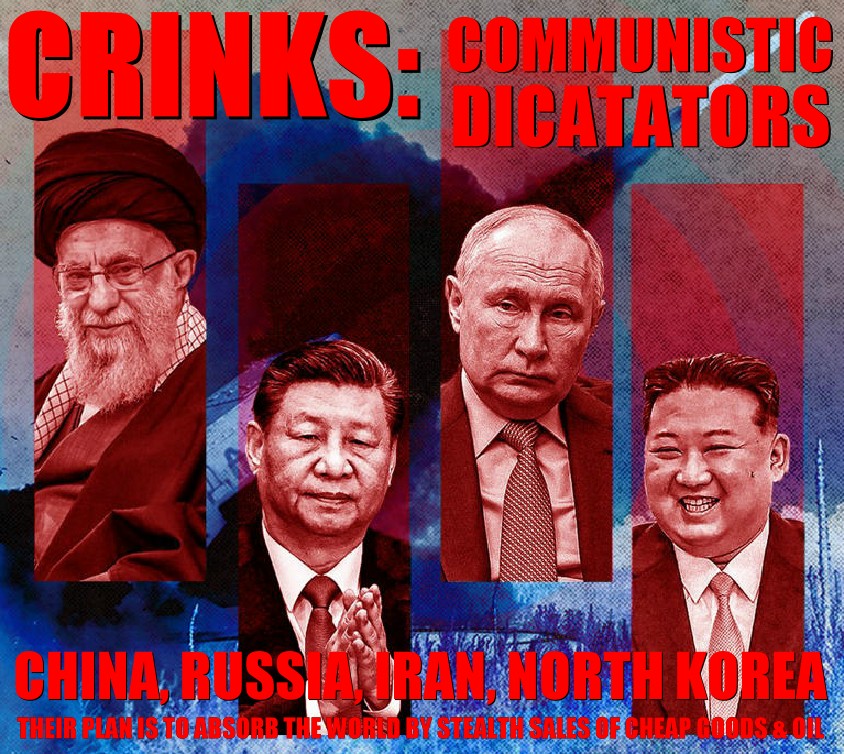
BOYCOT
WORLD WAR THREE - Don't let the CRINKs take over the
world. Stop and think. When looking for goods in the shops
and online, be sure not to purchase any products that come
from a fossil fueled dictator economy. Shop locally. Buy
goods that are made in NATO or other democracies. Grow your
own vegetables if you can. Don't drink Russian vodka, or
soft drinks in plastic bottles - the raw materials come from
China. Limit you tea intake, to leaves grown outside of
China. Or better still, drink African and Columbian coffee
instead. Use renewable electricity, and when it is
available, switch to hydrogen or methanol for your car.
Lithium for batteries comes from China, they have been
buying up the world's raw materials. These nations do not
have free elections, or freedom of speech. Should that
change, with genuine human rights, and a climb down in
military ambition. Then of course, we might welcome the next
generations of CRINK politicians back into the fold on
humanity.
CRINKS
Western governments need to have a proper strategy to deal with the increasingly coordinated and assertive axis of China, Russia, Iran and North Korea, or else World War Three is “inevitable”, MPs and insiders have said.
Experts warn that the group of autocratic countries – known as the CRINKs – are working more closely together in the background of conflicts in Ukraine and the Middle East, including providing weaponry and oil to each other to dodge western sanctions.
Western leaders and international organisations should draw up plans to deal with this increasing alignment of nations rather than only regarding them as single country threats, they say.
Fears that the conflicts in Ukraine and Gaza could spread into wider regional fighting have escalated in recent weeks, with Kyiv struggling to fend off Russia’s advance in the east, and Iran and Israel on the brink of an all-out war after the latest airstrikes overnight on Thursday.
Western leaders and international organisations should draw up plans to deal with this increasing alignment of nations rather than only regarding them as single country threats, they say.
Fears that the conflicts in Ukraine and Gaza could spread into wider regional fighting have escalated in recent weeks, with Kyiv struggling to fend off Russia’s advance in the east, and Iran and Israel on the brink of an all-out war after the latest airstrikes overnight in April 2024.
In late April 2024 the prime minister of Ukraine warned that if Russia wins in his country it could lead to World War Three.
Some $60bn in military aid from the US to rearm Ukraine’s dwindling arsenal has been stalled for months due to opposition inside the Republican party, and is only being put to a vote in the House of Representatives this weekend 20-21 April 2024. Thankfully passed.
Intelligence sources told i the escalation in the Middle East has forced the UK to hone its attention on a possible conflict between Israel and Iran, placing the invasion of Ukraine on the “backburner”.
Significant UK intelligence and military capabilities have already been reorganised to help monitor the flaring of tensions in the Middle East, with many resources coming directly from Ukraine, a source said.
But there are fears from within the intelligence community that a direct conflict between Israel and Iran would consume more of the UK’s capability, leaving an open door for Vladimir Putin’s ambitions in Ukraine.
“It’s all about Israel and Iran at the moment,” a UK intelligence source said, adding that if you step back and look at the geopolitical chess board, “Russia now has scope to make moves in Ukraine.”
But a Whitehall insider said the government was alive to the increasing alignment of the CRINKs, which includes activities such as providing weaponry and oil for each other to evade sanctions imposed by the West.
Russia’s war in Ukraine is bolstered by Iran-supplied drones and cruise missiles, and by ammunition from North Korea.
And despite heavy western-imposed sanctions on oil exports, Iran is selling 90 per cent of its crude to China.
There are also concerns among western governments that a world war could be triggered within the next three to four years if China invades Taiwan.
A US defence chief, Admiral John Aquilino, told the House Armed Services Committee last month that President Xi Jinping’s regime was building up its military and nuclear arsenal on a scale not seen since World War Two and that the People’s Liberation Army will be ready to invade the self-governed island by 2027.
Conservative MP Tobias Ellwood, a former defence minister and former chairman of the Commons defence select committee, told i: “By any measure, the scales are tipping.
“Our world is enduring an increasingly grim chapter in our history with no stakeholder, no superpower, no international alliance – indeed no global institution (such as the UN) in control of where our geo-politics is heading.
“Xi & Putin have quietly strengthened on a mission. Both have a disdain for the West, both dislike Western scrutiny into their domestic affairs.
“Both feel threatened by the current international rules-based order that calls for more democracy, more transparency, more accountability. The elites in both countries reject western standards and consequently want to see America/the West weakened.
“China sees Russia as its key strategic partner in dismantling the current liberal world order, with Iran and North Korea joining the club and much of the Global South reluctant to take sides.”
Mr Ellwood said a second Cold War is “already here” although it is “different to the last”. He added: “A world at war – but different to the last – is inevitable unless we rekindle a Cold War level of statecraft to swiftly and efficiently put fires like Ukraine out and contain this growing authoritarian competing axis of power.”
Defence Secretary Grant Shapps has been a leading voice inside the Cabinet warning of the dangers of the increasing aggression from CRINK nations. In December he warned that the world risked “sleepwalking” into a new autocratic era and that the West could not afford Ukraine to lose the war, while in a speech in January he warned that the world was now entering a “pre-war” phase.
Mr Shapps still believes the world is at risk of “sleepwalking” to war, i understands.
Foreign Secretary David
Cameron, at a private dinner with Donald Trump in Mar-a-Lago earlier this month, made a personal appeal to him to help unblock the aide to Ukraine.
As he continued his trip in Washington to press the case, Lord Cameron told Republicans – via a press conference alongside US Secretary of State Antony Blinken – it was “profoundly in your interest and your security and your future and the future of all your partners to release this money”.
The UK government’s Integrated Reviews of foreign, defence and national security policy in 2021 and 2023 identified the threat of cooperation between the four states.
Yet MPs and experts warn there needs to be a more overt strategy to counter the threat from the CRINKs.
Part of that strategy, they say, is increasing spending on defence: this week Chancellor
Jeremy Hunt admitted that all European countries had to be “prepared to spend more” on the Armed Forces, even though the UK government position is to only reach 2.5 per cent of GDP when “economic conditions allow”.
Ministers conceded this week this target would not be hit before the general election, expected in the autumn.
Military experts say the level of funding should be dictated by the nature of the threat, not the state of the public finances – in the same way billions of pounds of money was spent on tackling the
Covid pandemic in 2020.
But in addition to more defence funding there has to be a clearer strategy for how to spend this money in a more targeted way, experts say.
Conservative MP and member of the Commons Foreign Affairs Committee Bob Seely said: “Only history will judge if this period is one of heightened tensions, a pre-war phase or part of a global conflict using non-military as well as military tools, but we need to think much more about the type of conflicts western democracies are likely to face, and how to defend ourselves.
“We need to spend more on defence, but that funding needs to be spent intelligently. I see little point in delivering warships that can be sunk in seconds. Ukraine has defeated Russia’s Black Sea Fleet despite not having a navy of any worth.
“It is true that we are only a few steps away from an appallingly dangerous situation in Eastern Europe and in the Middle East. It has become more likely that tactical nuclear weapons could be used in either the Middle East or in Eastern Europe.
“The new Cold War was declared by Putin in 2007 but collectively Western nations pretended not to notice until Russia’s first invasion of Ukraine in 2014, and we only properly understood the nature of Putin’s regime from 2022.
“We need a strategy to deal with CRINKS nations, whilst understanding that each conflict or potential conflict is different.”
The failure this week of President Biden, Rishi Sunak and other western leaders to persuade Israeli premier Benjamin Netanyahu to “take the win” and not respond to Iran’s unprecedented attack by missiles and drones has heightened fears that an all-out war between the two countries is imminent.
After Israeli airstrikes on Thursday night, Tehran claimed it would not immediately retaliate – but this has not dampened concerns of a war.
Speaking before the latest Israeli strikes, Steven Cook, senior fellow for Middle East and Africa studies at the US think tank the Council on Foreign Relations, said: “I think the escalation risk from Iran’s attack is quite high, as the Israelis have said repeatedly that they will respond in a devastating fashion. And I think if they do there is a very significant possibility of escalation along the northern front.
“The Hezbollah factor is very - is quite significant, given the large numbers of rockets and missiles and drones in the Hezbollah arsenal.
“And then there’s the question of Arab countries and what they would do in the event of an Israeli counterstrike, given their own vulnerabilities.
Dubai is wide open to Iranian missile attack, as are some other major cities in the Gulf.”
With the likely re-election of Donald Trump as US president in November, there are also fears that his isolationist approach to foreign policy will set back Western efforts to defend the frontline against the CRINKs in Ukraine and in the
Middle
East.
If Russia declares victory in Ukraine, there are concerns that President Putin – once he has rearmed his military – will be emboldened to take military action against one of the Baltic states.
Latvia, Estonia and Lithuania are all members of Nato, meaning any strike would invoke Article 5 and a coordinated response from the alliance.
Experts believe President Putin is keen to test the strength of Nato’s solidarity, particularly if Mr Trump – who earlier this year said Russia could do “whatever the hell they want” to European countries that did not meet Nato’s 2 per cent defence spending target – wins a second presidency.
Ivana Stradner from the Washington-based nonpartisan think tank Foundation for Defense of Democracies, told i this summer’s Nato summit in Washington will be the most important for years and that 2024 was a pivotal year for the world.
She said: “Make no mistake: Putin is planning to attack a Nato country once he has finished in Ukraine.
“For the Kremlin, the war in Ukraine is not only about Ukraine. It’s about rewriting the world order, undermining the West and tearing down Nato. It is naďve to expect that Moscow does not have enough power to challenge the alliance.
“Putin does not need to send tanks and jets to Poland or any Baltic country. He can use his favourite hybrid warfare toolkit, such as information operations, weaponising migration or paramilitary groups to challenge Nato. Such activities are below the threshold of war but powerful enough to show that the alliance is a paper tiger.”
Dr Stradner added: “As the West shows weakness with Putin,
China is watching and learning.
“Trump’s isolationist approach to foreign policy is a dream come true for Putin. Trump has announced a peace agreement with Russia to stop this war. However, Trump’s wishes are not Putin’s wishes as Moscow will use time to strengthen its army and be ready for a round two. Putin only understands power and weakness emboldens him.
“With Russia’s aggression in Ukraine, the West is becoming more aware of the CRINK threat. For them, this war is about ideology and they represent the axis of authoritarianism.
“For many in the West it’s probably too philosophical and abstract thinking but unless we understand how our adversaries think, we are doomed to fail. I do not think the West has a strategy for the CRINK and it’s high time to make it and enforce it. Nato’s summit will be critical.
“Unfortunately, 2024 smells like 1938 when Chamberlain described the conflict between Germany and Czechoslovakia as the ‘quarrel in a far away country, between people of who we know nothing’.”
By Jane Merrick
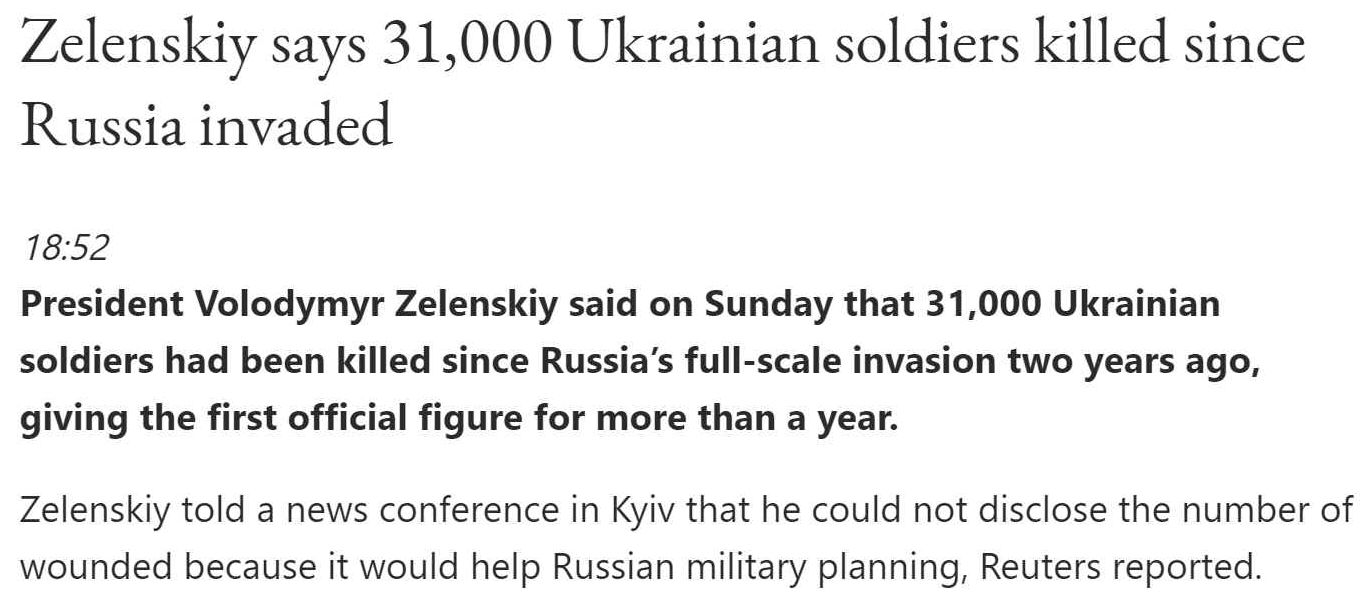
ABOUT
VOLODYMYR ZELENSKYY
Volodymyr Oleksandrovych Zelenskyy (born 25 January 1978) is a Ukrainian politician and former actor who has been serving as the sixth president of Ukraine since 2019.
Born to a Ukrainian Jewish family, Zelenskyy grew up as a native Russian speaker in Kryvyi Rih, a major city of Dnipropetrovsk Oblast in central Ukraine. Prior to his acting career, he obtained a degree in law from the Kyiv National Economic University. He then pursued a career in comedy and created the production company Kvartal 95, which produced films, cartoons, and TV shows including the TV series Servant of the People, in which Zelenskyy played a fictional Ukrainian president. The series aired from 2015 to 2019 and was immensely popular. A political party with the same name as the TV show was created in March 2018 by employees of Kvartal 95.
Zelenskyy announced his candidacy in the 2019 presidential election on the evening of 31 December 2018, alongside the New Year's Eve address of then-president Petro Poroshenko on the TV channel 1+1. A political outsider, he had already become one of the frontrunners in opinion polls for the election. He won the election with 73.23 percent of the vote in the second round, defeating Poroshenko. He has positioned himself as an anti-establishment and anti-corruption figure. As president, Zelenskyy has been a proponent of e-government and of unity between the Ukrainian- and Russian-speaking parts of the country's population. His communication style makes extensive use of social media, particularly Instagram. His party won a landslide victory in the snap legislative election held shortly after his inauguration as president. During the first two years of his administration, Zelenskyy oversaw the lifting of legal immunity for members of parliament (the Verkhovna Rada), the country's response to the COVID-19 pandemic and subsequent economic recession, and some limited progress in tackling corruption in Ukraine.
During his presidential campaign, Zelenskyy promised to end Ukraine's protracted conflict with Russia, and he has attempted to engage in dialogue with Russian president Vladimir Putin. His administration faced an escalation of tensions with Russia in 2021, culminating in the launch of an ongoing full-scale Russian invasion in February 2022. Zelenskyy's strategy during the Russian military buildup was to calm the Ukrainian populace and assure the international community that Ukraine was not seeking to retaliate. He initially distanced himself from warnings of an imminent war, while also calling for security guarantees and military support from
NATO to "withstand" the threat. After the start of the invasion, Zelenskyy declared martial law across Ukraine and a general mobilisation of the armed forces. Zelenskyy was named the Time Person of the Year for 2022.
PRESIDENTIAL CAMPAIGN 2019
In March 2018, members of Zelenskyy's production company Kvartal 95 registered a new political party called Servant of the People – the same name as the television program that Zelenskyy had starred in over the previous three years. Although Zelenskyy denied any immediate plans to enter politics and said he had registered the party name only to prevent it being appropriated by others, there was widespread speculation that he was planning to run. As early as October 2018, three months before his campaign announcement and six months before the presidential election, he was already a frontrunner in opinion polls. After months of ambiguous statements, on 31 December, less than four months from the election, Zelenskyy announced his candidacy for president of Ukraine on the New Year's Eve evening show on the TV channel 1+1. His announcement up-staged the New Year's Eve address of incumbent president Petro Poroshenko on the same channel, which Zelenskyy said was unintentional and attributed to a technical glitch.
Zelenskyy's presidential campaign against Poroshenko was almost entirely virtual. He did not release a detailed policy platform and his engagement with mainstream media was minimal; he instead reached out to the electorate via social media channels and YouTube clips. In place of traditional campaign rallies, he conducted stand-up comedy routines across Ukraine with his production company Kvartal 95. He styled himself as an anti-establishment, anti-corruption figure, although he was not generally described as a populist. He said he wished to restore trust in politicians, "to bring professional, decent people to power" and to "change the mood and timbre of the political establishment." On 16 April 2019, a few days before the election, 20 Ukrainian news outlets called on Zelenskyy to "stop avoiding journalists." Zelenskyy stated that he was not hiding from journalists but that he did not want to go to talk shows where "people of the old power" were "just doing PR" and that he did not have time to satisfy all interview requests.
Prior to the elections, Zelenskyy presented a team that included former finance minister Oleksandr Danylyuk and others. During the campaign, concerns were raised over his links to the oligarch Ihor Kolomoyskyi, a billionaire businessman who had gained control of the 1+1 Media Group in 2010. The group operates eight Ukrainian TV channels and broadcast the Servant of the People TV series from 2015 until 2019, featuring Zelenskyy in a comedian role as a national president.
President Poroshenko and his supporters claimed that Zelenskyy's victory would benefit Russia. On 19 April 2019 at Olimpiyskiy National Sports Complex presidential debates were held in the form of a show. In his introductory speech, Zelenskyy acknowledged that in 2014 he voted for Poroshenko, but "I was mistaken. We were mistaken. We voted for one Poroshenko, but received another. The first appears when there are video cameras, the other Petro sends Medvedchuk privietiki (greetings) to Moscow." Although Zelenskyy initially said he would serve only a single term, he walked back this promise in May 2021, saying he had not yet made up his mind.
Zelenskyy stated that as president he would develop the economy and attract investment to Ukraine through "a restart of the judicial system" and restoring confidence in the state. He also proposed a tax amnesty and a 5-per-cent flat tax for big business which could be increased "in dialogue with them and if everyone agrees." According to Zelenskyy, if people would notice that his new government "works honestly from the first day," they would start paying their taxes.
Zelenskyy achieved a plurality of the electorate (30%) in the first round of elections on 31 March 2019. In the second round, on 21 April 2019, he received 73 per cent of the vote to Poroshenko's 25 per cent, and was elected President of Ukraine. Polish president Andrzej Duda was one of the first European leaders to congratulate Zelenskyy. French president Emmanuel Macron received Zelenskyy at the Élysée Palace in Paris on 12 April 2019. On 22 April, U.S. president Donald Trump congratulated Zelenskyy on his victory over the telephone. European Commission president Jean Claude Juncker and European Council president Donald Tusk also issued a joint letter of congratulations and stated that the European Union (EU) will work to speed up the implementation of the remainder of the EU-Ukraine Association Agreement, including the Deep and Comprehensive Free Trade Area.

PRESIDENCY
Zelenskyy was inaugurated on 20 May 2019. Various foreign officials attended the ceremony in Ukraine's parliament (Verkhovna Rada), including Salome Zourabichvili (Georgia), Kersti Kaljulaid (Estonia), Raimonds Vējonis (Latvia), Dalia Grybauskaitė (Lithuania), János Áder (Hungary), Maroš Šefčovič (European Union), and Rick Perry (United States). Zelenskyy is the first Jewish president; with Volodymyr Groysman as prime minister, Ukraine became the first country other than Israel to simultaneously have a Jewish head of state and head of government. In his inaugural address, Zelenskyy dissolved the then Ukrainian parliament and called for early parliamentary elections (which had originally been due to be held in October of that year). One of Zelenskyy's coalition partners, the People's Front, opposed the move and withdrew from the ruling coalition.
On 28 May, Zelenskyy restored the Ukrainian citizenship of Mikheil Saakashvili.
Zelenskyy's first major proposal to change the electoral system from a plurality voting system to proportional representation with closed party lists was strongly rejected by the Ukrainian parliament, due to the belief that closed lists would lead to more corruption in government.
In addition, on 6 June, lawmakers refused to include Zelenskyy's key initiative on reintroducing criminal liability for illegal enrichment in the parliament's agenda, and instead included a similar bill proposed by a group of deputies. In June 2019 it was announced that the president's third major initiative, which seeks to remove immunity from lawmakers, diplomats and judges, would be submitted after the July 2019 Ukrainian parliamentary election. This initiative was completed on 3 September, when the new parliament passed a bill stripping lawmakers of legal immunity, delivering Zelenskyy a legislative victory by fulfilling one of his key campaign promises.
On 8 July, Zelenskyy ordered the cancellation of the annual Kyiv Independence Day Parade on Maidan Nezalezhnosti, citing costs. Despite this, Zelenskyy highlighted that the day would "honor heroes" on Independence Day, however the "format will be new." He also proposed to spend the money that would have been used to finance the parade on veterans.
In 2020, Zelenskyy's party proposed reforms to Ukraine's media laws with the intent to increase competition and loosen the dominance of Ukrainian oligarchs on television and radio broadcasters. Critics said it risked increasing media censorship in Ukraine because its clause of criminal responsibility for the distribution of disinformation could be abused.
In January 2020, Zelenskyy took a trip to Oman that was not published on his official schedule, appearing to combine a personal holiday with government business. His office said Zelenskyy paid for the entire trip himself. Nevertheless, he was criticised for a lack of transparency and critics pointed out he had once criticized his predecessor Poroshenko for taking an undisclosed vacation in the Maldives.
In January 2021, parliament passed a bill updating and reforming Ukraine's referendum laws, which Ukraine's Constitutional Court had declared unconstitutional in 2018. Fixing the referendum law had been one of Zelenskyy's campaign promises.
In June 2021, Zelenskyy submitted to the Verkhovna Rada a bill creating a public registry of Ukraine's oligarchs, banning them from participating in privatizations of state-owned companies, and forbidding them from contributing financially to politicians. Opposition party leaders supported Zelenskyy's goal of reducing oligarchs' influence on politics in Ukraine but were critical of his approach, saying the public register would be both dangerous, as it concentrated power in the president; and ineffective, since oligarchs were merely a "symbol" of more deeply-rooted corruption. The bill was passed into law in September 2021. Critics of Zelenskyy's administration have claimed that, in taking power away from the Ukrainian oligarchs, he has sought to centralize authority and strengthen his personal position.
THE DONBAS CONFLICT
One of Zelenskyy's central campaign promises had been to end the Russo-Ukrainian War and resolve the Russia-sponsored separatist movement there. On 3 June, Zelenskyy appointed former president Leonid Kuchma as Ukraine's representative in the Tripartite Contact Group for a settlement in the conflict. On 11 July 2019, Zelenskyy held his first telephone conversation with Russian president Vladimir Putin, during which he urged Putin to enter into talks mediated by European countries. The two leaders also discussed the exchange of prisoners held by both sides. In October 2019, Zelenskyy announced a preliminary deal struck with the separatists, under which the Ukrainian government would respect elections held in the region in exchange for Russia withdrawing its unmarked troops. The deal was met with heavy criticism and protests by both politicians and the Ukrainian public. Detractors noted that elections held in Donbas were unlikely to be free and fair, that the separatists had long driven most pro-Ukrainian residents out of the region to ensure a pro-Russia majority, and that it would be impossible to ensure Russia kept its end of the agreement. Zelenskyy defended his negotiations, saying the elections would not be held before a Russian withdrawal. The agreement failed to ease the conflict, as the separatists continued their attacks and Russia continued providing them with weapons and ammunition. Several Ukrainian nationalist militias and former militias also refused to accept the agreement, including the far-right Azov fighters in the Luhansk region of Donbas. Zelenskyy met personally with some of these groups and tried to convince them to surrender their unregistered weapons and accept the peace accord. Andriy Biletsky, the leader of the far-right National Corps and first commander of Azov, accused Zelenskyy of being disrespectful to army veterans and of acting on behalf of the Kremlin by leaving Ukrainians vulnerable to Russian aggression. Ultimately, the peace deal failed to reduce the violence, much less end the war.
In December 2019, Russia and Ukraine agreed to resume talks mediated by France and Germany under the so-called Normandy Format, which had been abandoned in 2016; it was Zelenskyy's first face-to-face meeting with Vladimir Putin. In July 2020, Zelenskyy announced a formal ceasefire with the separatists — the more than twentieth such attempt since the war began in 2014. Although the ceasefire was frequently violated over the next few years and overall violence remained high, ceasefire violations in 2020 did decrease by over 50 per cent compared to the previous year.

PRELUDE TO THE INVASION OF UKRAINE
In April 2021, in response to Russian military build-up at the Ukrainian borders, Zelenskyy spoke to American president Joe Biden and urged NATO members to speed up Ukraine's request for membership.
On 26 November 2021, Zelenskyy accused Russia and Ukrainian oligarch Rinat Akhmetov of backing a plan to overthrow his government. Russia denied any involvement in a coup plot and Akhmetov said in a statement that "the information made public by Volodymyr Zelenskiy about attempts to draw me into some kind of coup is an absolute lie. I am outraged by the spread of this lie, no matter what the president's motives are." In December 2021, Zelenskyy called for preemptive action against Russia.
On 19 January 2022, Zelenskyy said in a video message that the country's citizens should not panic and appealed to the media to be "methods of mass information and not mass hysteria." On 28 January, Zelenskyy called on the West not to create a "panic" in his country over a potential Russian invasion, adding that constant warnings of an "imminent" threat of invasion are putting the economy of Ukraine at risk. Zelenskyy said that "we do not see a bigger escalation" than in early 2021 when Russia's military build-up started. Zelenskyy and U.S. president Joe Biden disagreed on how imminent the threat was.
On 19 February, as worries of a Russian invasion of Ukraine grew, Zelenskyy warned the Munich Security Conference that Western nations should abandon their "appeasement" attitude toward Moscow. "Ukraine has been granted security assurances in exchange for giving up the world's third-largest nuclear arsenal. We don't have any firearms. And there's no security... But we have a right to urge a transformation from an appeasement policy to one that ensures security and peace," he stated.
In the early hours of 24 February, shortly before the start of the Russian invasion, Zelenskyy recorded an address to the citizens of both Ukraine and Russia. He disputed claims of the Russian government about the presence of neo-Nazis in the Ukrainian government and stated that he had no intention of attacking the Donbas region, while highlighting his personal connections to the area. In part of the address, he spoke in Russian to the people of Russia, appealing to them to pressure their leadership to prevent war:
Who will suffer the most from this? People. Who does not want this more than anyone? People. Who can prevent this? People.
Are these people present among you? I am sure there are. Public figures, journalists, musicians, actors, athletes, scientists, doctors, bloggers, stand-up comedians, Tik-Tokers and many more. Regular people. Regular, normal people. Men, women, the elderly, children, fathers, and most importantly, mothers. Just like people in Ukraine. Just like the authorities in Ukraine, no matter how much they try to convince you otherwise.
I know that they will not show this appeal of mine on Russian television. But the citizens of Russia must see it. They must know the truth. And the truth is that this needs to stop, before it is too late. And if the Russian leadership does not want to sit down at the table with us for the sake of peace, then perhaps, they will sit down at the table with you.
Do Russians want war? I would very much like to answer this question. But the answer depends only on you, the citizens of the Russian Federation.
The speech was widely described as "emotional" and "astonishing."
RUSSIAN INVASION OF UKRAINE 2022
On the morning of 24 February, Putin announced that Russia was initiating a "special military operation" in the Donbas. Russian missiles struck a number of military targets in Ukraine, and Zelenskyy declared martial law. Zelenskyy also announced that diplomatic relations with Russia were being severed, effective immediately. Later in the day, he announced general mobilisation. On 25 February, Zelenskyy said that despite Russia's claim that it was targeting only military sites, civilian sites were also being hit. In an early morning address that day, Zelenskyy said that his intelligence services had identified him as Russia's top target, but that he is staying in Kyiv and his family will remain in the country. "They want to destroy Ukraine politically by destroying the head of state," he said. In the early hours of 26 February, during the most significant assault by Russian troops on the capital of Kyiv, the United States government and Turkish president Recep Tayyip Erdoğan urged Zelenskyy to evacuate to a safer location, and both offered assistance for such an effort. Zelenskyy turned down both offers and opted to remain in Kyiv with its defense forces, saying that "the fight is here [in Kyiv]; I need ammunition, not a ride."
More than 90% of Ukrainians supported the actions of Zelenskyy, including more than 90% in western and central Ukraine and more than 80% in Russian-speaking regions in eastern and southern
Ukraine. A Pew Research Center poll found that 72% of Americans had confidence in Zelenskyy's handling of international affairs.
Zelenskyy has gained worldwide recognition as the wartime leader of Ukraine during the Russian invasion; historian Andrew Roberts compared him to
Winston
Churchill. Harvard Political Review said that Zelenskyy "has harnessed the power of social media to become history's first truly online wartime leader, bypassing traditional gatekeepers as he uses the internet to reach out to the people." He has been described as a national hero or a "global hero" by many commentators, including publications such as The Hill, Deutsche Welle, Der Spiegel and USA Today. BBC News and The Guardian have reported that his response to the invasion has received praise even from previous critics. During the invasion, Zelenskyy has been reportedly the target of more than a dozen assassination attempts; three were prevented due to tips from Russian FSB employees who opposed the invasion. Two of those attempts were carried out by the Wagner Group, a Russian paramilitary force, and the third by the Kadyrovites, the personal guard of Chechen leader Ramzan Kadyrov. While speaking about Ukrainian civilians who were killed by Russian forces, Zelenskyy said:
" We will not forgive. We will not forget. We will punish everyone who committed atrocities in this war... We will find every scum who was shelling our cities, our people, who was shooting the missiles, who was giving orders. You will not have a quiet place on this earth – except for a grave."
On 7 March 2022, Czech president Miloš Zeman decided to award Zelenskyy with the highest state award of the Czech Republic, the Order of the White Lion, for "his bravery and courage in the face of Russia's invasion."
Zelenskyy has repeatedly called for direct talks with Russian president Vladimir Putin, saying: "Good Lord, what do you want? Leave our land. If you don't want to leave now, sit down with me at the negotiating table. But not from 30 meters away, like with Macron and Scholz. I don't bite." Zelenskyy said he was "99.9 percent sure" that Putin thought the Ukrainians would welcome the invading forces with "flowers and smiles."
On 7 March 2022, as a condition for ending the invasion, the Kremlin demanded Ukraine's neutrality; recognition of Crimea, which had been annexed by Russia, as Russian territory; and recognition of the self-proclaimed separatist republics of Donetsk and Luhansk as independent states. On 8 March, Zelenskyy expressed willingness to discuss Putin's demands. Zelenskyy said he is ready for dialogue, but "not for capitulation." He proposed a new collective security agreement for Ukraine with the United States, Turkey, France, Germany as an alternative to the country joining NATO. Zelenskyy's Servant of the People party said that Ukraine would not give up its claims on Crimea, Donetsk and Luhansk. However, Zelenskyy said that Ukraine was considering giving the Russian language protected minority status.
On 15 March 2022, Polish Prime Minister Mateusz Morawiecki, together with
Czech Prime Minister Petr Fiala and Slovenian Prime Minister Janez Janša, visited Kyiv to meet with Zelenskyy in a display of support for
Ukraine. On 16 March 2022, a deepfake appeared online of Zelenskyy calling on Ukrainian citizens to surrender to Russia. The attack was largely deemed to have failed at its intended goal. The video is considered to be the first use of deepfake technology in a global-scale disinformation attack.
Zelenskyy has made an effort to rally the governments of Western nations in an effort to isolate Russia. He has made numerous addresses to the legislatures of the EU, UK, Poland,
Australia, Canada, US,
Germany, Israel,
Italy, Japan, the Netherlands, Romania, and the Nordic countries.
On 23 March, Zelenskyy was calling on Russians to emigrate from Russia so as not to finance the war in Ukraine with their taxes. In March 2022, Zelenskyy supported the suspension of 11 Ukrainian political parties with ties to Russia: the Socialist Party of Ukraine, Derzhava, Left Opposition, Nashi, Opposition Bloc, Opposition Platform — For Life, Party of Shariy, Progressive Socialist Party of Ukraine, Union of Leftists, and the Volodymyr Saldo Bloc. The Communist Party of Ukraine, another pro-Russia party, had already been banned in 2015 because of its support to the Donbas separatists. Zelenskyy has also supported consolidating all TV news stations into a single 24-hour news broadcast run by the state of Ukraine.
2ND PHASE - SOUTH-EASTERN FRONT 8 APRIL 2 SEPTEMBER 2022
In April 2022, Zelenskyy criticized Germany's ties with Russia. In May 2022, Zelenskyy said that Ukrainian men of conscription age had a duty to remain in Ukraine and that up to 100 Ukrainian soldiers were killed every day in the fighting in eastern Ukraine. He made the comment after he was asked about an online petition calling to lift a prohibition on Ukrainian men leaving Ukraine. As Zelenskyy ordered a general military mobilization in February 2022, he also banned men aged 18 to 60 from leaving Ukraine. In early June 2022, Zelenskyy's adviser Mykhailo Podolyak said that up to 200 Ukrainian soldiers were killed in combat every day.
Zelenskyy denounced suggestions by former US diplomat Henry Kissinger that Ukraine should cede control of Crimea and Donbas to Russia in exchange for peace. On 25 May 2022, he said that Ukraine would not agree to peace until Russia agreed to return Crimea and the Donbas region to Ukraine. However, he later said he did not believe that all the land seized by Russia since 2014, which includes Crimea, could be recaptured by force, saying that "If we decide to go that way, we will lose hundreds of thousands of people."
On 3 May 2022, Zelenskyy accused Turkey of having "double standards" by welcoming Russian tourists while attempting to act as an intermediary between Russia and Ukraine in order to end the war. On 25 May 2022, Zelenskyy said that he was satisfied with China's policy of staying away from the conflict. In August 2022, he said China had the economic leverage to pressure Putin to end the war, adding "I'm sure that without the Chinese market for the Russian Federation, Russia would be feeling complete economic isolation. That's something that China can do – to limit the trade [with Russia] until the war is over." According to Zelenskyy, since the beginning of the invasion, Chinese President Xi Jinping had refused to speak with him."
On 30 May 2022, Zelenskyy criticized EU leaders for being too soft on Russia and asked, "Why can Russia still earn almost a billion euros a day by selling energy?" The study published by the Centre for Research on Energy and Clean Air (CREA) calculates that the EU paid Russia about €56 billion for fossil fuel deliveries in the three months following the start of Russia's invasion.
Zelenskyy visiting a school in Irpin in Bucha Raion on the occasion of Knowledge Day on 1 September 2022
On 20 June 2022, Zelenskyy addressed African Union (AU) representatives via videoconference. He invited African leaders to a virtual meeting, but only four of them attended. On 20 July 2022, South America's Mercosur trade bloc refused Zelenskyy's request to speak at the trade bloc's summit in Paraguay.
3RD PHASE - COUNTEROFFENSIVES & ANNEXATIONS
Speaking about the 2022 Russian mobilization, Zelenskyy called on Russians to not submit to "criminal mobilization," saying: "Russian commanders do not care about the lives of Russians — they just need to replenish the empty spaces left" by killed and wounded Russian soldiers. Following Putin's announcement of Russia annexing four regions of Ukrainian territory it had seized during its invasion, Zelenskyy announced that Ukraine would not hold peace talks with Russia while Putin was president.
On 25 September 2022, Zelenskyy said that Putin's threats to use nuclear weapons "could be a reality." He added that Putin "wants to scare the whole world" with nuclear blackmail. He also said that Putin is aware that the "world will never forgive" a Russian nuclear strike. When asked what kind of relationship Ukrainians and Ukraine will have with Russia after the war, Zelenskyy replied that "They took too many people, too many lives. The society will not forgive them," adding that "It will be the choice of our society whether to talk to them, or not to talk at all, and for how many years, tens of years or more." On 21 December 2022, Zelenskyy visited the United States on his first foreign trip since the war began. He met with
President Joe Biden and addressed Congress delivering his full speech in English. The
United States announced they would supply Patriot missiles to Ukraine as had been requested.
RUSSIA'S
ADOLF HITLER
It's
nothing new, and is well reported in the media, that Russia's
'Adolf
Hitler,' and his Imperial expansion agenda, may not be directly linked to climate change, though inevitably is
diverting resources away from tackling global
warming. A situation that Vladimir Putin will have been
enjoying, the global temperature rise benefitting Russia's war criminal, in
thawing the cold landscape and freezing permafrost.
For
sure, Europe and the US should have predicted and be wary of
purchasing fossil
fuels from a madman, with a latent world domination
agenda. Having agreed to supply cheap supplies of energy with
China and India, though
Xi Jinping and Narendra
Modi, might fight shy of World War
Three,
they are building nuclear submarines
and space
exploration agenda's along with aggressive
commercial exports. Thus if Russia is weakened by
fighting Ukraine, it would boost their economies. Not least
in the supply of cheaper oil, petroleum and gas. Presumably,
it would not bother them if the US and Russia wiped each
other out, leaving China and India to battle it out with Japan,
Australia and South America.
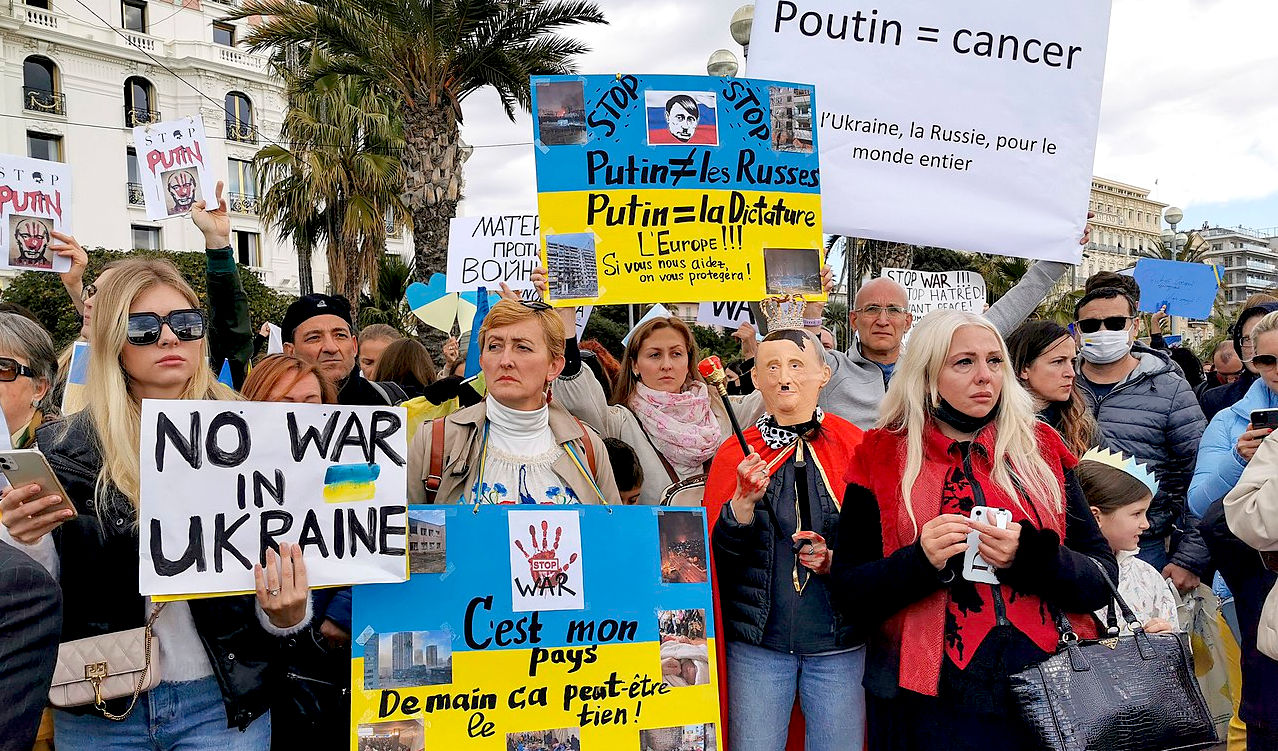
On the subject of
NATO and
climate
change, and how the war between Russia and Ukraine may be affecting
climate
change, as in escalating
global
warming. Here are some key points to consider.
We should consider some background information on
the current conflict between Russia and Ukraine, and its implications
for regional and global security, and the part of NATO in addressing
environmental challenges and climate
change, as well as the recent
Climate Change and Security Action Plan adopted by NATO Allies [1].
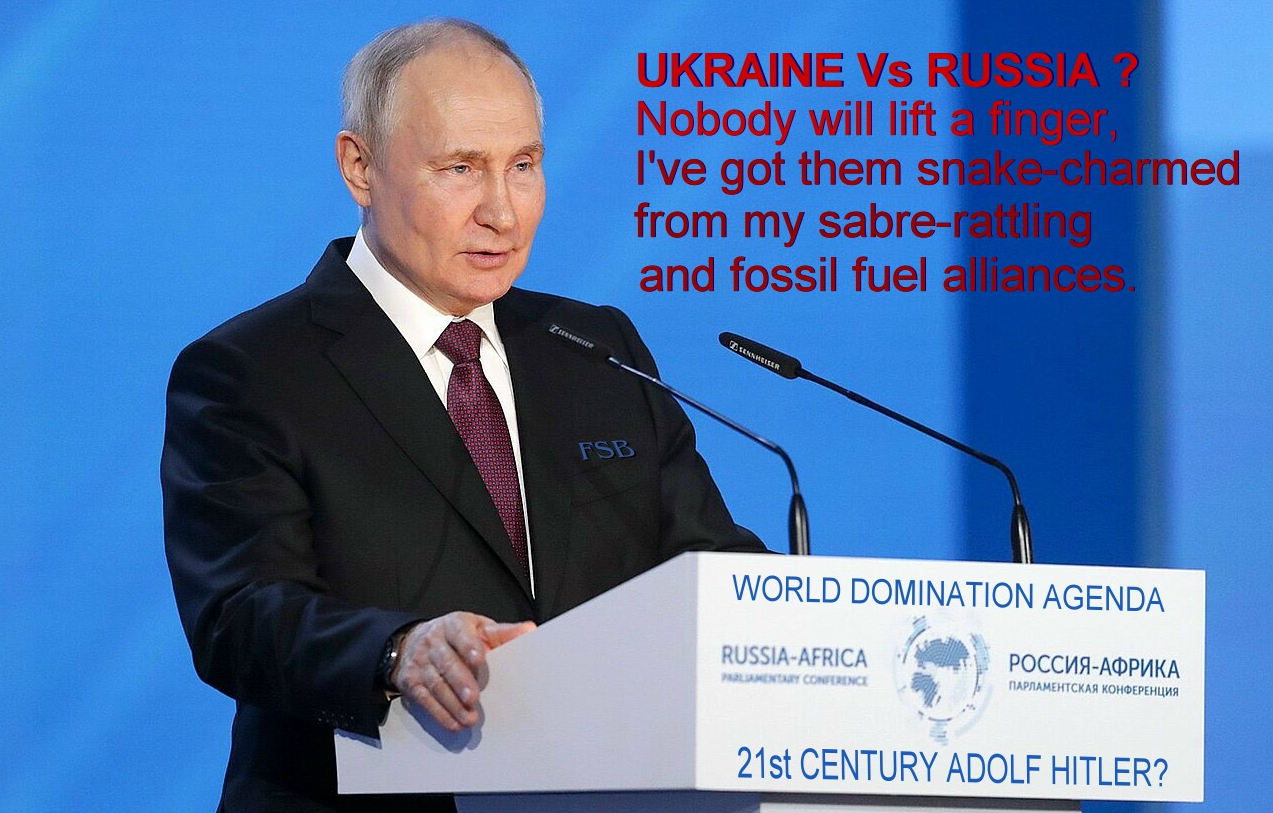
It
takes a lot of pot warming to walk into another country, so
that nobody lifts a finger. Having done it once with Crimea,
and after cajoling all the usual political allies, blinding
them with reliance on cheap fossil fuels, and how powerful
the former USSR is, with plenty of military displays and
much talk of nuclear dominance. One might imagine from
Hitler's example in Europe, with Blitzkrieg tactics, that
Putin believed Ukraine was a Cakewalk.
The International Criminal Court
(ICC), located in the Hague, is the court that prosecutes individuals for war crimes, crimes against humanity, and genocide.
As of March 6, 2024, the ICC has issued arrest warrants for two individuals in connection with the situation in
Ukraine. Vladimir Putin is accused of the war crime of unlawful deportation of children from occupied Ukrainian territories. Maria Alekseyevna
Lvova-Belova: is also accused of the responsibility for the same war crime.
It's important to note that having an arrest warrant issued doesn't equate to being declared a war criminal, it is simply an allegation. A trial would be needed to determine
guilt, and if found guilty, would then be a convicted war
criminal.
The
environmental impact of Russia’s invasion of Ukraine
has targeted Ukraine’s energy system, starting in
October 2022, has been particularly damaging to the country’s greenhouse
gas emissions,
forest
fires, oil depots, gas power plants, and renewable energy sources. You can
imagine the estimates of the first year of war’s carbon footprint in the region.
The geopolitical implications of Russia’s aggression for climate
action, the invasion of Ukraine may undermine the international cooperation and trust needed to address
climate change
effectively.
Many have compared Putin’s actions with those of
Hitler, who also used historical disquisitions and nationalist rhetoric
to justify his expansionist ambitions,
despite the efforts of the United
Nations and the Universal Declaration of Human
Rights,
that was designed by the parties to prevent such aggressions,
and a similar scenario from happening again. But here we are
again, with Putin just waiting for the right moment to take advantage
of the West's apparent weaknesses, having built up a
suitable stash of cash and arms, to wage his expansionist
plans, almost exactly as Adolf
Hitler, leading up to World
War Two.
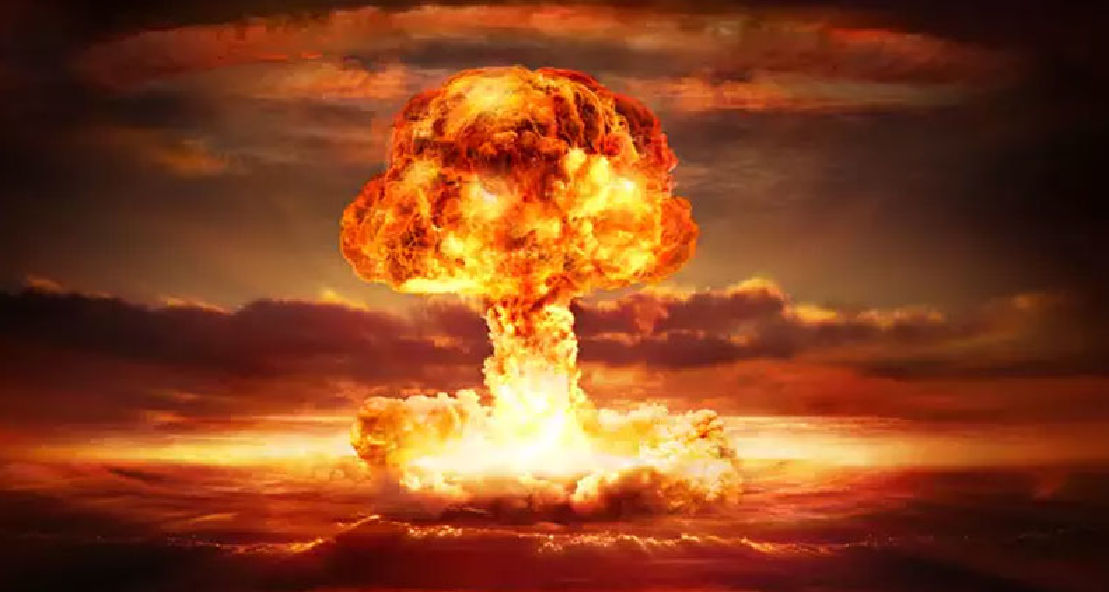
We
can thus imagine a World
War Three scenario, unless the Imperialist dictator is
stopped dead in his tracks. The problem being how to do that
without the Russian loon, from pushing the nuke button.
Clearly, his age is one trigger, lest his career dream elude him
completely as he succumbs to old age. Where he cannot be
sure his successors will be so foolhardy in the modern
internet age, knowing the Russian population
are more enlightened. And voting might actually count one
day.
Especially concerning international issues such a warming of
the planet, biological diversity and plastic pollution;
poisoning our fish stocks.
The
problem being that Vladimir Putin is a relic of the Cold
War. It appears that he cannot get his head out of that
particular cloud. Taking lessons directly from Adolf
Hitler's pocket book on world domination. On that score,
Vladimir Putin is not even original, as you might agree on
reflection of the Führer's approach.
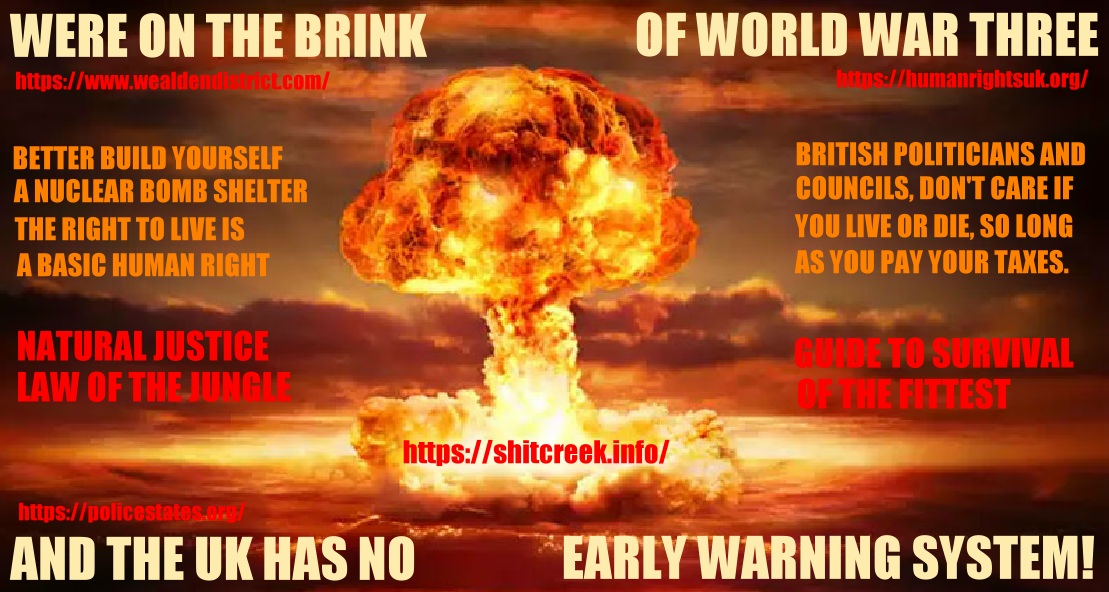
Take
a leaf out of the Hiroshima and Nagasaki
bombs, that effectively ended WW2. If Putin is rash enough
to unleash thermonuclear hell, the West should take that
opportunity to completely neutralize the Russian threat, so
sending a clear message to potentially fanatical adversaries
like Iran and North Korea. No matter what the cost. It will
be cheaper for planet
earth in the long run.
Indeed,
as allies of Russia, Iran and North Korea may care to enjoin. Giving the
remainder of the developed world, NATO allies and even UK
allies who are not members of NATO, the opportunity to
obliterate those threats. From which (relatively) clean
slate, the world, as Nations
United, might rebuild from a more stable starting point.
Barren, but stable; a clean canvas. Unthinkable that such a confrontation represents, every
cloud has a silver lining. Leaving only China and India, to
come to terms with. Who may then see reason, in curtailing
their present nuclear ambitions. Not least because the cheap
coal, gas and oil will have evaporated. Putting their
economies into a nose dive, save for rice, tea and spices as
exports. But when? When will the land be washed sufficiently
to farm, and how many farmers will be able bodied enough to
tend the crops?
Fingers
crossed, the world will not be too polluted, and that any
nuclear winter might be survivable. Though this goes against
all that the Cleaner Ocean Foundation stands
for, in the
real world, one should be prepared. In the words of Sir
Winston Churchill: "Speak softly, but carry a
big stick."
What
is clear, is that any nation treading a similar path to Adolf
Hitler, will eventually come up against some serious
competition for survival. In any nuclear conflict, cannibalism
will be rife. Pork
pie anyone?
Portrait
SURVIVING
A NUCLEAR HOLOCAUST
While
the threat of nuclear war is a critical concern, it's important to
understand that preventing nuclear conflict is paramount, the exception being
when fired upon, thus a retaliatory second strike and up to
date defence system is essential.
A
nuclear winter
is a hypothetical scenario with devastating consequences, and preparing
for it can only offer limited and uncertain benefits in the face of an
event that must first be actively prevented through diplomacy and global
cooperation, if at all possible.
However, if the unthinkable were to happen, it's
crucial to note that there is no guaranteed way to survive a nuclear
winter. There are no grants for bunkers or stocks of food.
The severity of its impact would depend on numerous factors,
including the scale of the nuclear exchange and the prevailing
environmental conditions.
If Iran and North Korea don't turn chicken, the thermonuclear fallout will be expansive, potentially all
encompassing. Meaning longer in bunkers, on stored foods and H2O.
That the ordinary citizen cannot afford. And the armed
forces have not provided or stocked for sufficient after
event combat. Presumably, if an aggressor is nutty enough to
push the red button, they will have a follow up invasion
plan.
Here are some general precautions that might be considered if such a catastrophic event were to occur:
Immediate Shelter:
1. Seek immediate shelter in a subterranean location like a basement, underground bunker, or subway station. These
offer some protection from the initial blast, heat, and radiation.
2. Remain indoors for at least 24-48 hours as this allows
radioactive fallout to settle, significantly reducing its immediate threat.
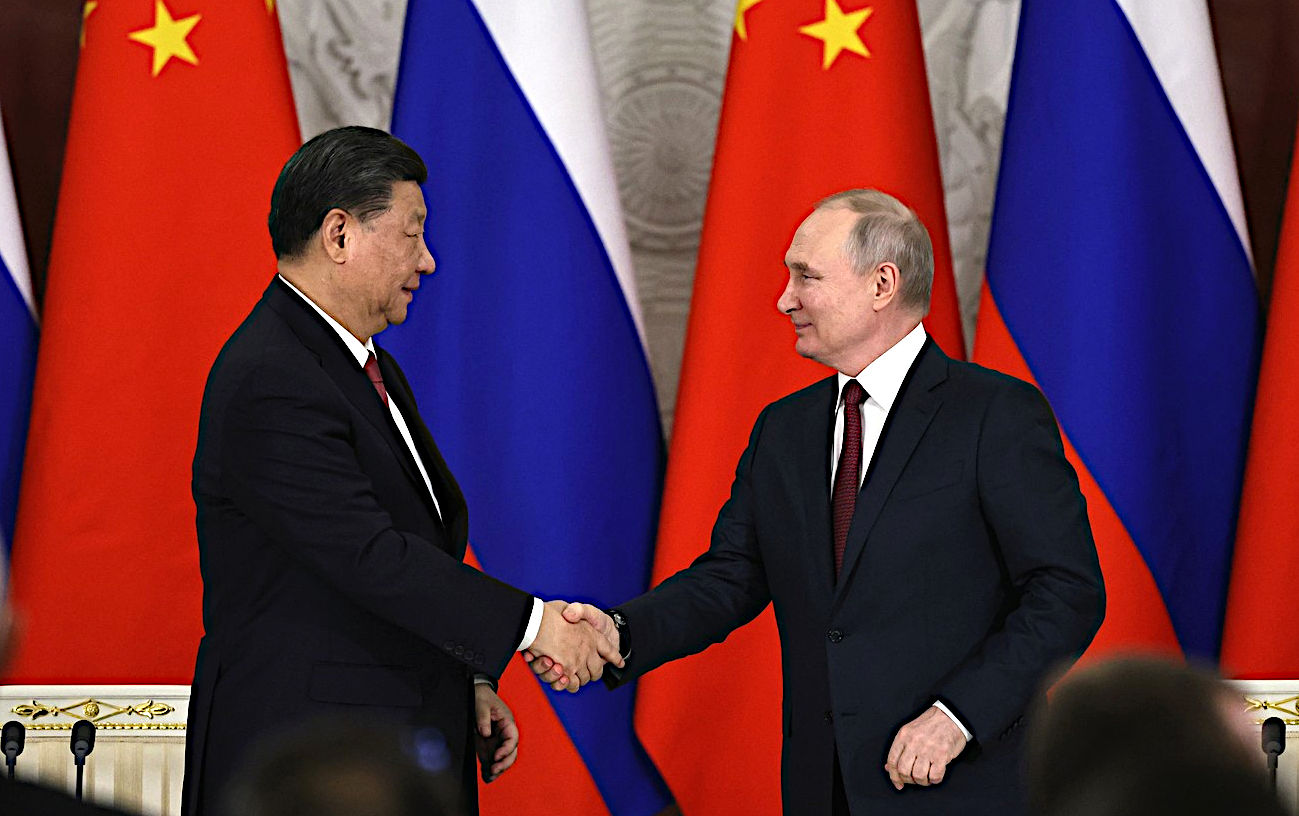
China
has a long established relationship with Russia, to include
satellites for space wars, apart from the import of cheap
fossil fuels, to underpin a massive building programme that
would end in tears, and bankruptcy. China has been lending
money to strategic projects such as port developments, all
over the world, as part of their expansion and export drive.
They have also invested in wind turbine generation to allow
for such loans.
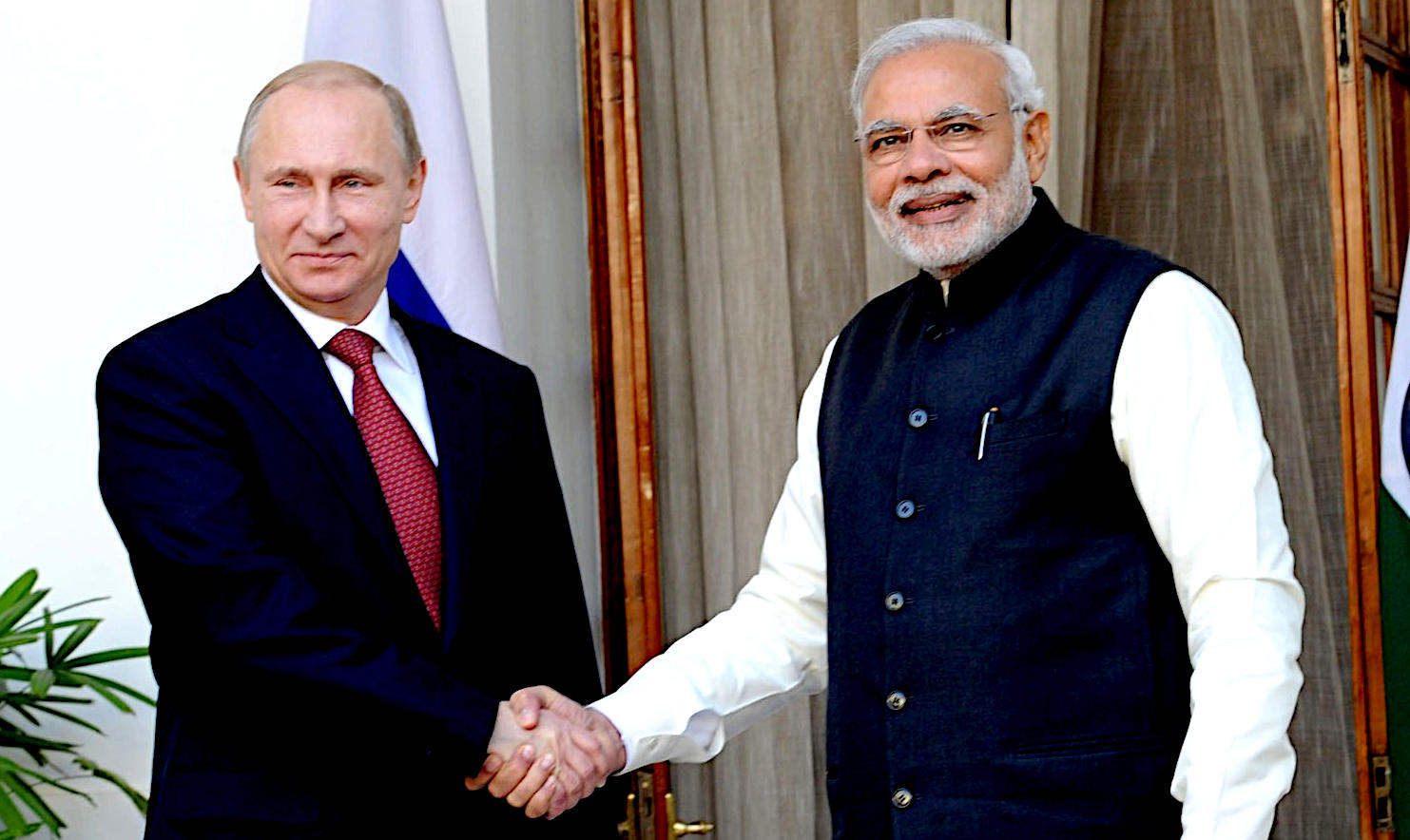
Vladimir
Putin and Narendra Modi, no doubt shaking hands on some
deal, one of which could have been the continued supply of
fossil fuels to underpin the rapid industrial expansion of
India's economy, nuclear navy and space program. Despite,
those exports financing Russia's invasion of Ukraine. Does
that make India an enemy and a risk?
Long-Term Survival:
- Food and water stockpiles: Having access to non-perishable
food and
water is crucial for long-term survival. Aim for a minimum of two weeks' supply per person, and ideally much longer if possible.
- Air filtration: Filtering the air you breathe is essential as radioactive dust can be present for weeks or months.
Consider purchasing HEPA filters or improvising filtration systems using available materials.
- Medical supplies: Maintaining a basic stock of first-aid and medical supplies is important to address potential
injuries and illnesses.
- Community and communication: Establishing communication channels and cooperating with others is crucial for
sharing resources, information, and emotional support.
It's crucial to emphasize that these measures are highly speculative and offer no guarantee of survival. The consequences
of a nuclear winter would be catastrophic, with widespread environmental damage,
food
shortages, and societal collapse.
Therefore, preventing nuclear war is the only truly effective way to avoid the horrors of nuclear winter. This necessitates
continued efforts towards diplomacy, non-proliferation, and risk reduction. Individuals can contribute by supporting organizations dedicated to
peace-building and global security and advocating for policies that promote dialogue and understanding between nations.
The war between
Russia and Ukraine has undoubtedly presented a complex situation for
NATO member nations, with potential implications for both climate change
and defence spending. Let's
take a look at some of the main points.
CLIMATE CHANGE
Increased Focus on Energy Security: The
war has exposed Europe's dependence on Russian energy sources,
particularly natural gas. This has sparked renewed efforts to diversify
energy supplies and accelerate the transition to renewable energy
sources. While this long-term shift could ultimately benefit climate
change mitigation, short-term solutions might involve increased reliance
on fossil fuels from other sources, potentially offsetting some of the
progress made on emissions reduction.
Potential Disruption of Climate Action: The war is diverting significant resources and attention from other pressing global issues, including
climate
change. This could disrupt international
cooperation on climate action initiatives and hinder progress towards
achieving emissions reduction targets.
DEFENCE SPENDING
Increased Defence Expenditure: The war
has heightened security concerns among NATO members, leading to calls
for increased defence spending. Many member states have committed to
raising their defence budgets to meet the alliance's target of spending
2% of GDP on defence. This shift in resources towards defence comes at
the expense of other budgetary priorities, potentially including
investments in climate change initiatives.
Potential Long-Term Impacts:
The war could have long-term consequences for NATO's strategic
direction. If the conflict persists or escalates, it may necessitate
continued high levels of defence spending, creating a persistent tension
between
security needs and climate action.
MEMBER
NATIONS PERSPECTIVES
Balancing Act: Member nations face the
challenge of balancing their response to the war with their commitments
to address climate change. This could involve seeking solutions that
address immediate security concerns while still promoting long-term
sustainability.
Diversity of Views:
There will likely be divergences in member states' perspectives on how
best to navigate this complex situation. Some countries might prioritize
immediate security needs, while others might emphasize the importance
of maintaining focus on climate action.
It is important to note that this is a rapidly
evolving situation, and the long-term consequences of the war for NATO
and climate change are still uncertain. However, the above points
highlight some of the potential challenges and opportunities that the
war presents for member nations.
It's also worth noting that some argue that increased defence spending can coexist with
climate
action.
Some propose investing in "green
defence" technologies to improve efficiency and minimize environmental
impact. Additionally, some believe that by addressing the root causes of
conflict, such as
poverty and resource scarcity, NATO can contribute to a more stable and
sustainable future.
Ultimately, how individual member nations and NATO as a whole
navigate this complex situation will depend on their evolving priorities and the trajectory of the war in
Ukraine.
Ukraine
represents the fight for freedom and the rights of every
human to live a full life, free from oppression.
https://www.nato.int/cps/en/natohq/news_223084.htm
https://www.nato.int/cps/en/natohq/news_223084.htm
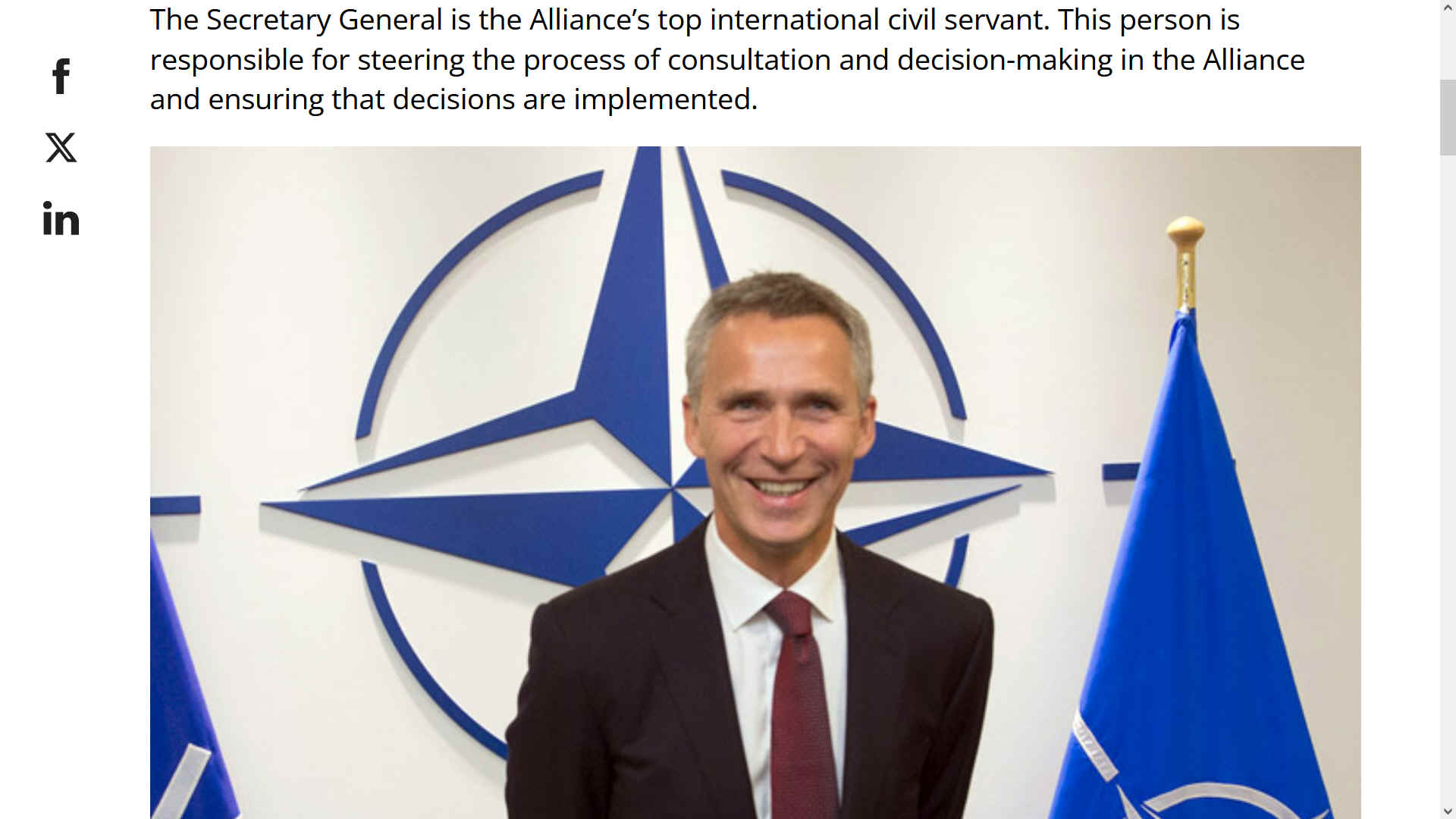
NATO
CONTACTS
At present, NATO has 31 member countries. These
countries, called NATO Allies, are sovereign states that come together
through NATO to discuss political and security issues and make
collective decisions by consensus.
NATO was created by 12 countries from Europe and North America
on 4 April 1949. Since then, 19 more countries have joined NATO through
nine rounds of enlargement (in 1952, 1955, 1982, 1999, 2004, 2009,
2017, 2020 and 2023). Article 10 of the North
Atlantic
Treaty sets out how countries can join the Alliance. It states that
membership is open to any "European State in a position to further the
principles of this Treaty and to contribute to the security of the North
Atlantic area".
Any decision to invite a country to join the Alliance is taken by the North
Atlantic Council, NATO's principal political decision-making body, on the basis of consensus among all Allies.
The Secretary General is the principal spokesperson
of the Alliance and represents the Alliance in public on behalf of the
member countries, reflecting their common positions on political issues.
The post is currently held by Jens Stoltenberg,
former Prime Minister of Norway, who took up his responsibilities on 1
October 2014.
https://www.nato.int/
https://www.msn.com/en-gb/news/world/world-war-3-inevitable-unless-west-wakes-up-to-new-threat/ar-AA1njtsU
https://www.msn.com/en-gb/news/world/world-war-3-inevitable-unless-west-wakes-up-to-new-threat/ar-AA1njtsU
https://www.nato.int/
